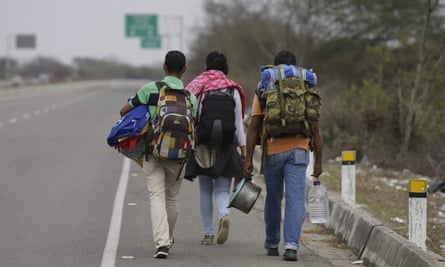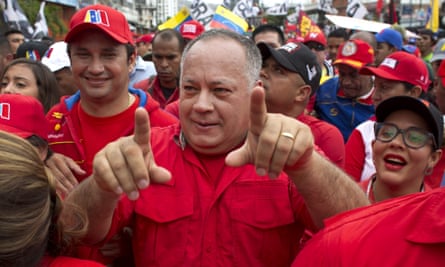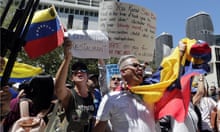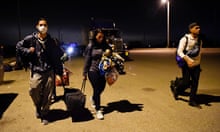Venezuela’s number two official has suggested his country’s escalating migration crisis – described by the United Nations as one of the worst in Latin American history – is being staged as part of a rightwing ruse to undermine his government.
Speaking at a congress of the ruling United Social party this week, Diosdado Cabello implied that images of Venezuelans fleeing through South America on foot had been manufactured.
“Doesn’t it strike you as suspicious there are photos of [these people] walking along the roadside in Peru, walking along the roadside in Ecuador, walking along the roadside in Colombia,” the president of Venezuela’s constituent assembly told delegates, according to the Caracas broadsheet El Nacional.
“It’s as if it was: ‘Lights, camera, action!’ It is a campaign against our country – a campaign of extraordinary dimensions,” Cabello added.

The UN estimates 2.3 million Venezuelans have fled since 2015 with Colombia expecting 2 million more to follow by 2020. That would mean 4.3 million people – 14% of Venezuela’s population – had left. Last week, the UN’s migration agency warned the mass migration is nearing a “crisis moment” comparable to events involving refugees in the Mediterranean. Many of those now heading into neighbouring countries such as Brazil and Colombia are so impoverished they do so on foot.
In his speech, Cabello urged those who had left to return: “We ask these young people who have gone to come back to Venezuela. Let’s build the fatherland you dream of. We will welcome you with open arms.”
On Tuesday, Venezuelan state media trumpeted the “repatriation” of 89 migrants who had reportedly been flown home from Peru free of charge after suffering exploitation abroad.

But Javier Corrales, a Venezuela expert from Amherst College in the US, said he suspected Nicolás Maduro’s government in some ways welcomed an exodus that deprived Venezuela’s fractured opposition of desperately needed in-country support.
“To tell you the truth, I don’t think the government minds that people are leaving in droves because it’s an escape mechanism for discontent. It’s less welfare the state has to provide and less potential for unrest.”
Corrales said the exodus also enabled Maduro’s administration to co-opt new supporters by giving them the jobs of those who left. “The government has ways to profit from this tragedy … so they don’t really have an incentive to bring this to an end.”
Geoff Ramsey, a Venezuela expert from the Washington Office on Latin America, described Cabellos’s claims as part of a two-pronged propaganda strategy targeting both domestic and international audiences.
At home, “the government wants to give the impression that things are going to get better and are under control” after the recent attempt to assassinate Maduro and the efforts to tame rampant hyperinflation. “Obviously the fact that thousands of Venezuelans are feeling the country every day punches a huge hole in that discourse,” Ramsey said.
Abroad, Caracas hoped to convince potential leftwing allies it was the victim of “some kind of imperialist conspiracy”.
But Ramsey said those efforts were falling short too, with even left-leaning Latin American nations such as Ecuador and Uruguay increasingly voicing criticism of Venezuela’s “authoritarian slide”.








